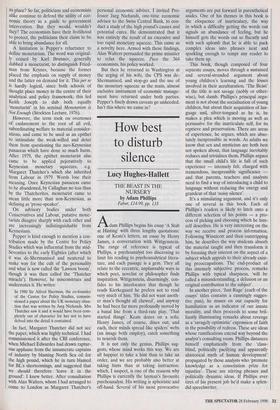How best to disturb silence
Lucy Hughes-Hallett
THE BEAST IN THE NURSERY by Adam Phillips Faber, £14.99, pp. 133 Adam Phillips begins his essay 'A Stab at Hinting' with three lengthy quotations: one of Keats's letters, an essay by Henry James, a conversation with Wittgenstein. The range of reference is typical of Phillips, a psychoanalyst too discerning to limit his reading to psychoanalytical litera- ture, and each passage is a gem. They all relate to the eccentric, unplannable ways in which poet, novelist or philosopher finds inspiration. Wittgenstein, disarmingly, con- fides to his interlocutor that though he reads. Kierkegaard he prefers not to read very much of him. 'He did not want anoth- er man's thought all chewed', and anyway he had been far more profoundly moved by a banal line from a third-rate play, 'That started things'. Keats dozes on a sofa; Henry James, of course, dines out; and each, their minds spread like spiders' webs (an image both employ), catch something to nourish them.
It is not only the genius, Phillips sug- gests, whose mind works this way. We are all happier to take a hint than to take an order, and we are probably also better at taking hints than at taking instruction: which, I suspect, is one of the reasons why Phillips is currently the layman's favourite psychoanalyst. His writing is aphoristic and off-hand. Several of his most provocative arguments are put forward in parenthetical asides. One of his themes in this book is the eloquence of inarticulacy, the way in which a difficulty getting the words out signals an abundance of feeling, but he himself gets the words out so fluently and with such aplomb that he is able to pack complex ideas into phrases neat and sparkling enough to tempt any reader to take them up.
This book, though composed of four separate essays, moves through a sustained and several-stranded argument about young children's learning and the losses involved in their acculturation. The Beast' of the title is not savage (nobly or other- wise), but dumb. Phillips's principal argu- ment is not about the socialisation of young children, but about their acquisition of lan- guage and, silver-tongued as he is, he makes a plea which is moving as well as persuasive for the inarticulate self, for its reprieve and preservation. There are areas of experience, he argues, which are abso- lutely inexpressible in words. As adults we know that sex and mysticism are both best not spoken about, that language inevitably reduces and trivialises them. Phillips argues that the small child's life is full of such experience — intensely felt, charged with tremendous, inexpressible significance and that parents, teachers and analysts need to find a way of introducing a child to language without reducing the energy and grandeur of that 'noisy silence'.
It's a stimulating argument, and it's only one of several in this book. Each of Phillips's readers is likely to latch onto a different selection of his points — a pro- cess of picking and choosing which he him- self describes. He is very interesting on the way we receive and process information. Following Winnicott and then outstripping him, he describes the way students absorb the material taught and then transform it by focusing their interest on the aspect of a subject which appeals to their already exist- ing preoccupations. The end-product of this intensely subjective process, remarks Phillips with typical sharpness, 'will be called a misunderstanding, a delusion or an original contribution to the subject'.
In another piece, 'Just Rage' (each of the essays' titles contains a cunningly sugges- tive pun), he muses on our capacity for humiliation as an indicator of our innate morality, and then proceeds to some bril- liantly illuminating remarks about revenge as a 'savagely optimistic' expression of faith in the possibility of redress. These are ideas whose ramifications extend way beyond the analyst's consulting room. Phillips distances himself emphatically from the 'class- blind, politically pacifying and apparently ahistorical myth of human development' propagated by those analysts who 'promote knowledge as a consolation prize for injustice'. These are stirring phrases and politically dynamic ideas. If Phillips ever tires of his present job he'd make a splen- did speechwriter.


























































 Previous page
Previous page